
1
Don't own so much clutter that you will be relieved to see your house catch fire.Wendell Berry
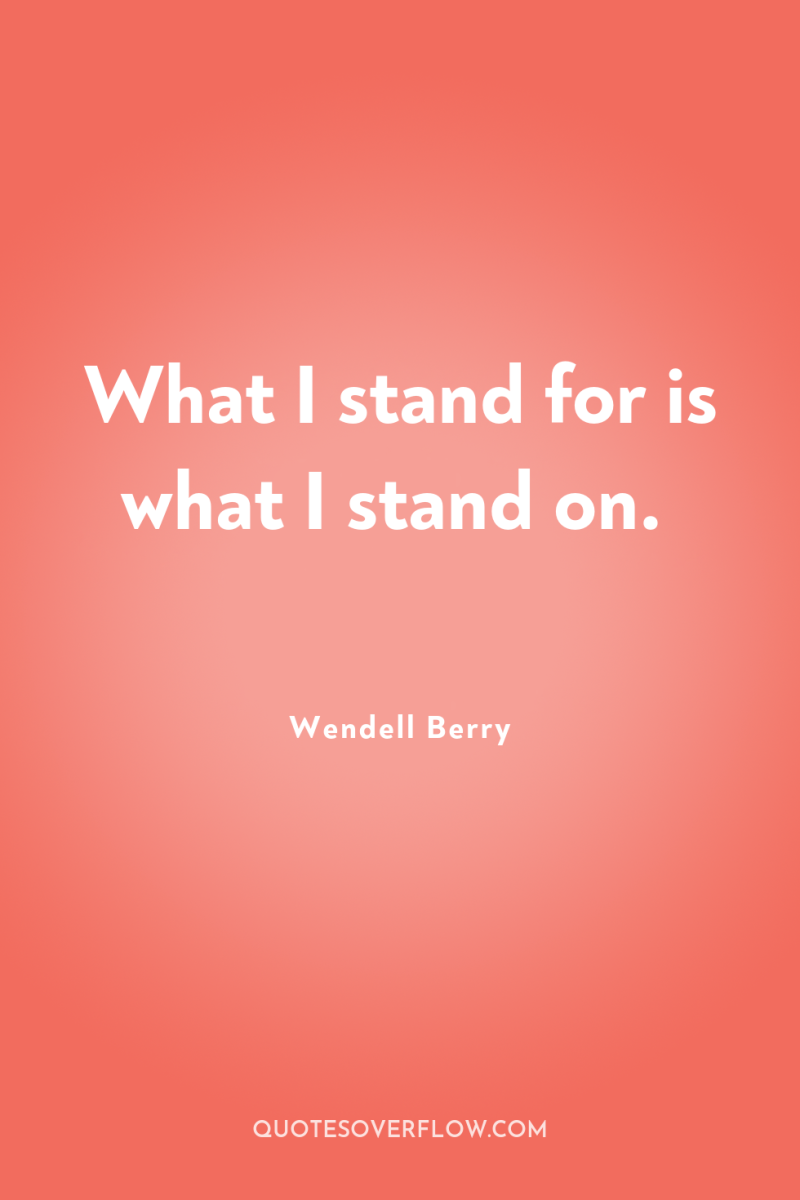
2
What I stand for is what I stand on.Wendell Berry
3
The complexity of our present trouble suggests as never before that we need to change our present concept of education. Education is not properly an industry, and its proper use is not to serve industries, either by job-training or by industry-subsidized research. It's proper use is to enable citizens to live lives that are economically, politically, socially, and culturally responsible. This cannot be done by gathering or "accessing" what we now call "information" - which is to say facts without context and therefore without priority. A proper education enables young people to put their lives in order, which means knowing what things are more important than other things; it means putting first things first.Wendell Berry
4
Until modern times, we focused a great deal of the best of our thought upon rituals of return to the human condition. Seeking enlightenment or the Promised Land or the way home, a man would go or be forced to go into the wilderness, measure himself against the Creation, recognize finally his true place within it, and thus be saved both from pride and from despair. Seeing himself as a tiny member of a world he cannot comprehend or master or in any final sense possess, he cannot possibly think of himself as a god. And by the same token, since he shares in, depends upon, and is graced by all of which he is a part, neither can he become a fiend; he cannot descend into the final despair of destructiveness. Returning from the wilderness, he becomes a restorer of order, a preserver. He sees the truth, recognizes his true heir, honors his forebears and his heritage, and gives his blessing to his successors. He embodies the passing of human time, living and dying within the human limits of grief and joy.(pg.95, "The Body and the Earth").Wendell Berry
5
I take literally the statement in the Gospel of John that God loves the world. I believe that the world was created and approved by love, that it subsists, coheres, and endures by love, and that, insofar as it is redeemable, it can be redeemed only by love. I believe that divine love, incarnate and indwelling in the world, summons the world always toward wholeness, which ultimately is reconciliation and atonement with God.Wendell Berry
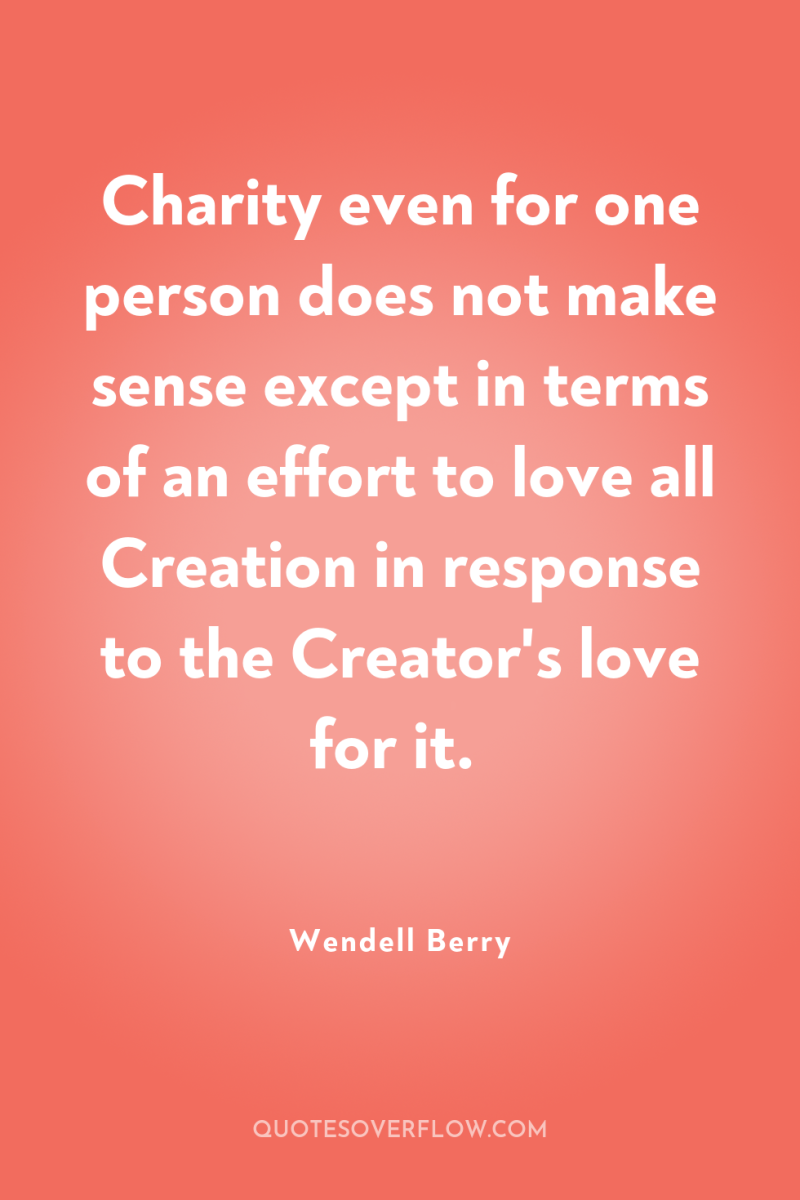
6
Charity even for one person does not make sense except in terms of an effort to love all Creation in response to the Creator's love for it.Wendell Berry
7
We could say that the human race is a great coauthorship in which we are collaborating with God and nature in the making of ourselves and one another. From this there is no escape. We may collaborate either well or poorly or we may refuse to collaborate, but even to refuse to collaborate is to exert an influence and to affect the quality of the product. This is only a way of saying that by ourselves we have no meaning and no dignity; by ourselves we are outside the human definition, outside our identity. .Wendell Berry
8
I don't think it is enough appreciated how much an outdoor book the Bible is. It is a "hypaethral book, " such as Thoreau talked about - a book open to the sky. It is best read and understood outdoors, and the farther outdoors the better. Or that has been my experience of it. Passages that within walls seem improbable or incredible, outdoors seem merely natural. This is because outdoors we are confronted everywhere with wonders; we see that the miraculous is not extraordinary but the common mode of existence. It is our daily bread. .Wendell Berry
9
Good human work honors God's work. Good work uses no thing without respect, both for what it is in itself and for its origin. It uses neither tool nor material that it does not respect and that it does not love. It honors nature as a great mystery and power, as an indispensable teacher, and as the inescapable judge of all work of human hands. It does not dissociate life and work, or pleasure and work, or love and work, or usefulness and beauty. To work without pleasure or affection, to make a product that is not both useful and beautiful, is to dishonor God, nature, the thing that is made, and whomever it is made for. This is blasphemy: to make shoddy work of the work of God. But such blasphemy is not possible when the entire Creation is understood as holy and when the works of God are understood as embodying and thus revealing His spirit. (pg. 312, Christianity and the Survival of Creation).Wendell Berry
10
It is impossible to see how good work might be accomplished by people who think that our life in this world either signifies nothing or has only a negative significance. If, on the other hand, we believe that we are living souls, God's dust and God's breath, acting our parts among other creatures all made of the same dust and breath as ourselves; and if we understand that we are free, within the obvious limits of moral human life, to do evil or good to ourselves and to the other creatures - then all our acts have a supreme significance. If it is true that we are living souls and morally free, then all of us are artists. All of us are makers, within mortal terms and limits, of our lives, of one another's lives, of things we need and use.. If we think of ourselves as living souls, immortal creatures, living in the midst of a Creation that is mostly mysterious, and if we see that everything we make or do cannot help but have an everlasting significance for ourselves, for others, and for the world, then we see why some religious teachers have understood work as a form of prayer.. Work connects us both to Creation and to eternity. (pg. 316, Christianity and the Survival of Creation) .Wendell Berry
11
I thought, He must forebear to reveal His power and glory by presenting Himself as Himself, and must be present only in the ordinary miracle of the existence of His creatures. Those who wish to see Him must see Him in the poor, the hungry, the hurt, the wordless creatures, the groaning and travailing beautiful world.Wendell Berry
12
Creation is thus God's presence in creatures. The Greek Orthodox theologian Philip Sherrard has written that "Creation is nothing less than the manifestation of God's hidden Being." This means that we and all other creatures live by a sanctity that is inexpressibly intimate, for to every creature, the gift of life is a portion of the breath and spirit of God. (pg. 308, Christianity and the Survival of Creation).Wendell Berry
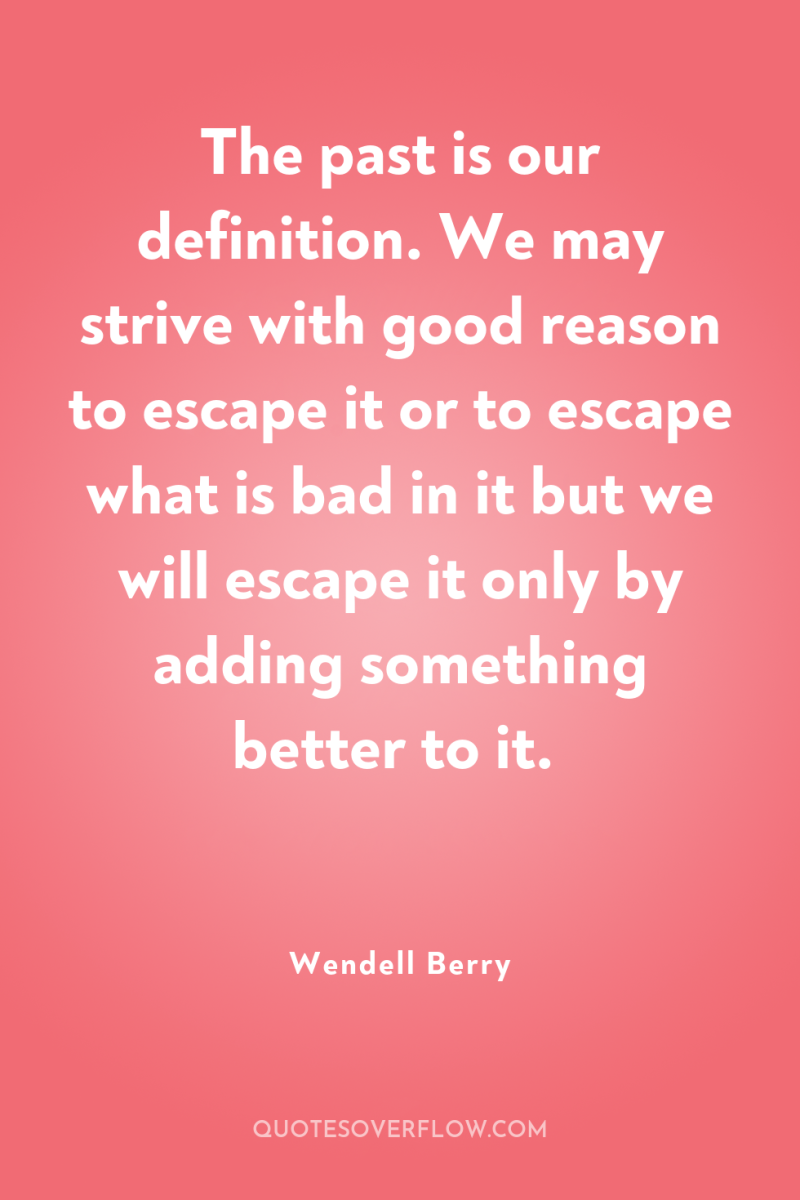
13
The past is our definition. We may strive with good reason to escape it or to escape what is bad in it but we will escape it only by adding something better to it.Wendell Berry
14
The soul, in its loneliness, hopes only for "salvation." And yet what is the burden of the Bible if not a sense of the mutuality of influence, rising out of an essential unity, among soul and body and community and world? These are all the works of God, and it is therefore the work of virtue to make or restore harmony among them. The world is certainly thought of as a place of spiritual trial, but it is also the confluence of soul and body, word and flesh, where thoughts must become deeds, where goodness must be enacted. This is the great meeting place, the narrow passage where spirit and flesh, word and world, pass into each other. The Bible's aim, as I read it, is not the freeing of the spirit from the world. It is the handbook of their interaction. It says that they cannot be divided; that their mutuality, their unity, is inescapable; that they are not reconciled in division, but in harmony. What else can be meant by the resurrection of the body? The body should be "filled with light, " perfected in understanding. And so everywhere there is the sense of consequence, fear and desire, grief and joy. What is desirable is repeatedly defined in the tensions of the sense of consequence.Wendell Berry
15
Some of the most memorable, and least regrettable, nights of my own youth were spent in coon hunting with farmers. There is no denying that these activities contributed to the economy of farm households, but a further fact is that they were pleasures; they were wilderness pleasures, not greatly different from the pleasures pursued by conservationists and wilderness lovers. As I was always aware, my friends the coon hunters were not motivated just by the wish to tree coons and listen to hounds and listen to each other, all of which were sufficiently attractive; they were coon hunters also because they wanted to be afoot in the woods at night. Most of the farmers I have known, and certainly the most interesting ones, have had the capacity to ramble about outdoors for the mere happiness of it, alert to the doings of the creatures, amused by the sight of a fox catching grasshoppers, or by the puzzle of wild tracks in the snow. .Wendell Berry
16
As I age in the world it will rise and spread, and be for this place horizonand orison, the voice of its winds. I have made myself a dream to dreamof its rising, that has gentled my nights. Let me desire and wish well the lifethese trees may live when Ino longer rise in the morningsto be pleased with the green of themshining, and their shadows on the ground, and the sound of the wind in them.Wendell Berry
17
Living without expectations is hard but, when you can do it, good. Living without hope is harder, and that is bad. You have got to have hope, and you mustn’t shirk it. Love, after all, 'hopeth all things.' But maybe you must learn, and it is hard learning, not to hope out loud, especially for other people. You must not let your hope turn into expectation.Wendell Berry
18
[My grandfather] returned to what he called ‘studying.’ He sat looking down at his lap, his left hand idle on the chair arm, his right scratching his head, his white hair gleaming in the lamplight. I knew that when he was studying he was thinking, but I did not know what about. Now I have aged into knowledge of what he thought about. He thought of his strength and endurance when he was young, his merriment and joy, and how his life’s burdens had then grown upon him. He thought of that arc of country that centered upon Port William as he first had known it in the years just after the Civil War, and as it had changed, and as it had become; and how all that time, which would have seemed almost forever when he was a boy, now seemed hardly anytime at all. He thought of the people he remembered, now dead, and of those who had come and gone before his knowledge, and of those who would come after, and of his own place in that long procession.Wendell Berry
19
The Peace of Wild ThingsWhen despair for the world grows in meand I wake in the night at the least soundin fear of what my life and my children’s lives may be, I go and lie down where the wood drakerests in his beauty on the water, and the great heron feeds. I come into the peace of wild thingswho do not tax their lives with forethoughtof grief. I come into the presence of still water. And I feel above me the day-blind starswaiting with their light. For a time I rest in the grace of the world, and am free.Wendell Berry
20
Want of imagination makes things unreal enough to be destroyed. By imagination I mean knowledge and love. I mean compassion. People of power kill children, the old send the young to die, because they have no imagination. They have power. Can you have power and imagination at the same time? Can you kill people you don’t know and have compassion for them at the same time?Wendell Berry
21
How to be a Poet (to remind myself) Make a place to sit down. Sit down. Be quiet. You must depend upon affection, reading, knowledge, skill–more of each than you have–inspiration work, growing older, patience, for patience joins time to eternity… Breathe with unconditional breath the unconditioned air. Shun electric wire. Communicate slowly. Live a three-dimensional life; stay away from screens. Stay away from anything that obscures the place it is in. There are no unsacred places; there are only sacred places and desecrated places. Accept what comes from silence. Make the best you can of it. Of the little words that come out of the silence, like prayers prayed back to the one who prays, make a poem that does not disturb the silence from which it came.Wendell Berry
22
From the union of power and money, from the union of power and secrecy, from the union of government and science, from the union of government and art, from the union of science and money, from the union of ambition and ignorance, from the union of genius and war, from the union of outer space and inner vacuity, the Mad Farmer walks quietly away.Wendell Berry
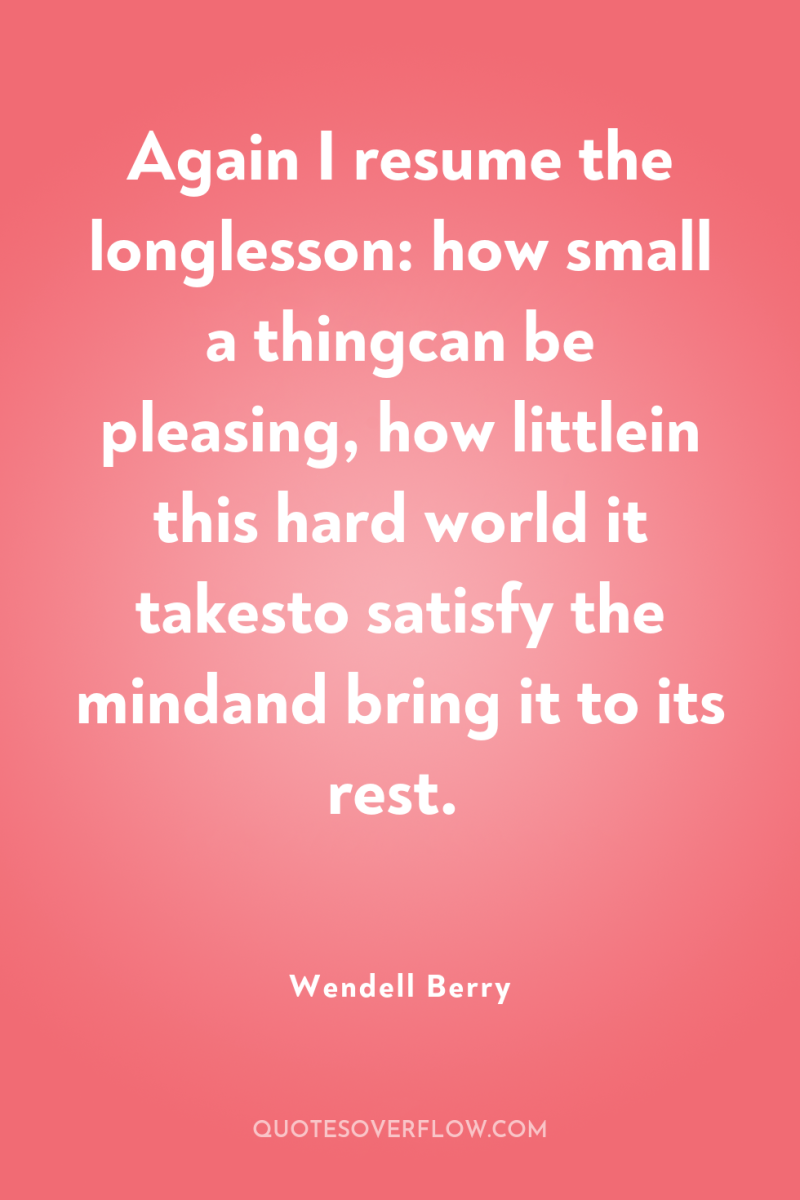
23
Again I resume the longlesson: how small a thingcan be pleasing, how littlein this hard world it takesto satisfy the mindand bring it to its rest.Wendell Berry
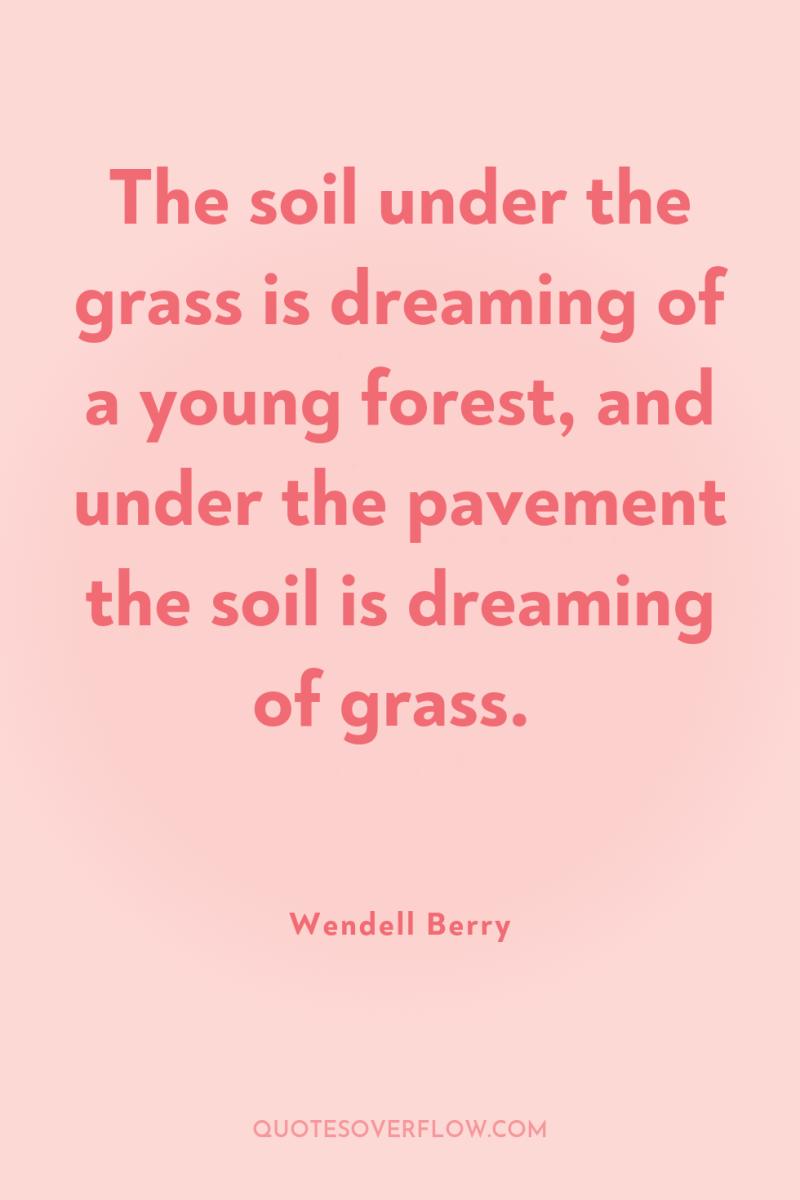
24
The soil under the grass is dreaming of a young forest, and under the pavement the soil is dreaming of grass.Wendell Berry
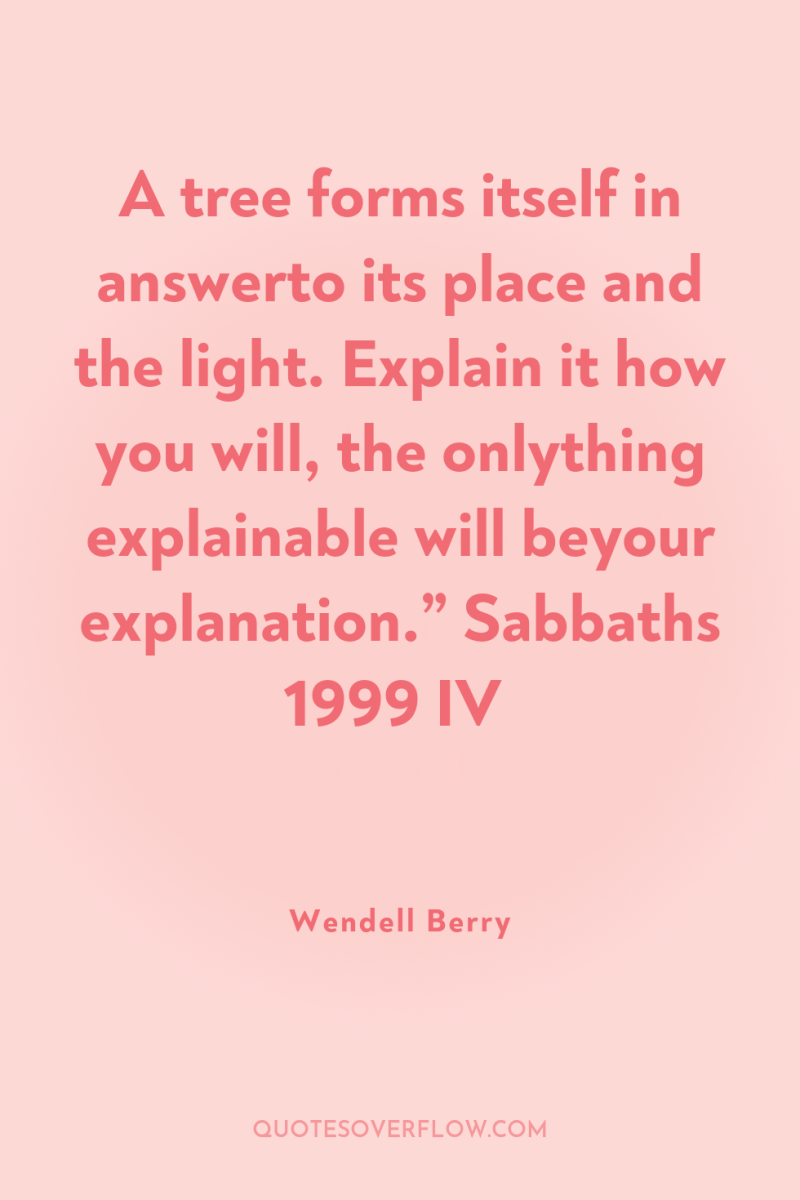
25
A tree forms itself in answerto its place and the light. Explain it how you will, the onlything explainable will beyour explanation.” Sabbaths 1999 IVWendell Berry
26
I’ve come down from the skylike some damned ghost, delayedtoo long… To the abandoned fieldsthe trees returned and grew. They stand and grow. Time comes To them, time goes, the trees Stand; the only place They go is where they are. Those wholly patient ones… They do no wrong, and they Are beautiful. What more Could we have thought to ask?.. I stand and wait for lightto open the dark night. I stand and wait for prayerto come and find me here.” Sabbaths 2000 IX.Wendell Berry
27
The inletour friend looks as he didwhen we first knew him, and until I wake I believe I will die of grief, for I knowthat this boy grew into a manwho was a faithful friendwho died.Wendell Berry
28
A purposeless virtue is a contradiction in terms. Virtue, like harmony, cannot exist alone; a virtue must lead to harmony between one creature and another. To be good for nothing is just that. If a virtue has been thought a virtue long enough, it must be assumed to have practical justification - though the very longevity that proves its practicality may obscure it. That seems to be what happened with the idea of fidelity.. Our age could be characterized as a manifold experiment in faithlessness, and if it has as yet produced no effective understanding of the practicalities of faith, it has certainly produced massive evidence of the damage and disorder of its absence.(pg.115-116, "The Body and the Earth") .Wendell Berry
29
There are, it seems, two muses: the Muse of Inspiration, who gives us inarticulate visions and desires, and the Muse of Realization, who returns again and again to say "It is yet more difficult than you thought." This is the muse of form. It may be then that form serves us best when it works as an obstruction, to baffle us and deflect our intended course. It may be that when we no longer know what to do, we have come to our real work and when we no longer know which way to go, we have begun our real journey. The mind that is not baffled is not employed. The impeded stream is the one that sings.Wendell Berry
30
In order to survive, a plurality of true communities would require not egalitarianism and tolerance but knowledge, an understanding of the necessity of local differences, and respect. Respect, I think, always implies imagination - the ability to see one another, across our inevitable differences, as living souls. (pg. 181, Sex, Economy, Freedom, and Community)Wendell Berry
31
The acquisition of knowledge always involves the revelation of ignorance - almost is the revelation of ignorance. Our knowledge of the world instructs us first of all that the world is greater than our knowledge of it. To those who rejoice in the abundance and intricacy in Creation, this is a source of joy, as it is to those who rejoice in freedom.. To those would-be solvers of "the human problem, " who hope for knowledge equal to (capable of controlling) the world, it is a source of unremitting defeat and bewilderment. The evidence is overwhelming that knowledge does not solve "the human problem." Indeed, the evidence overwhelmingly suggests - with Genesis - that knowledge is the problem. Or perhaps we should say instead that all our problems tend to gather under two questions about knowledge: Having the ability and desire to know, how and what should we learn? And, having learned, how and for what should we use what we know? (pg. 183, People, Land, and Community).Wendell Berry
32
If we are looking for insurance against want and oppression, we will find it only in our neighbors' prosperity and goodwill and, beyond that, in the good health of our worldly places, our homelands. If we were sincerely looking for a place of safety, for real security and success, then we would begin to turn to our communities - and not the communities simply of our human neighbors but also of the water, earth, and air, the plants and animals, all the creatures with whom our local life is shared.(pg. 59, "Racism and the Economy") .Wendell Berry
33
Much protest is naïve; it expects quick, visible improvement and despairs and gives up when such improvement does not come. Protesters who hold out longer have perhaps understood that success is not the proper goal. If protest depended on success, there would be little protest of any durability or significance. History simply affords too little evidence that anyone’s individual protest is of any use. Protest that endures, I think, is moved by a hope far more modest than that of public success: namely, the hope of preserving qualities in one’s own heart and spirit that would be destroyed by acquiescence.Wendell Berry
34
It could be said that a liberal education has the nature of a bequest, in that it looks upon the student as the potential heir of a cultural birthright, whereas a practical education has the nature of a commodity to be exchanged for position, status, wealth, etc., in the future. A liberal education rests on the assumption that nature and human nature do not change very much or very fast and that one therefore needs to understand the past. The practical educators assume that human society itself is the only significant context, that change is therefore fundamental, constant, and necessary, that the future will be wholly unlike the past, that the past is outmoded, irrelevant, and an encumbrance upon the future -- the present being only a time for dividing past from future, for getting ready. But these definitions, based on division and opposition, are too simple. It is easy, accepting the viewpoint of either side, to find fault with the other. But the wrong is on neither side; it is in their division.. Without the balance of historic value, practical education gives us that most absurd of standards: "relevance, " based upon the suppositional needs of a theoretical future. But liberal education, divorced from practicality, gives something no less absurd: the specialist professor of one or another of the liberal arts, the custodian of an inheritance he has learned much about, but nothing from.Wendell Berry
35
What marriage offers - and what fidelity is meant to protect - is the possibility of moments when what we have chosen and what we desire are the same. Such a convergence obviously cannot be continuous. No relationship can continue very long at its highest emotional pitch. But fidelity prepares us for the return of these moments, which give us the highest joy we can know; that of union, communion, atonement (in the root sense of at-one-ment).. To forsake all others does not mean - because it cannot mean - to ignore or neglect all others, to hide or be hidden from all others, or to desire or love no others. To live in marriage is a responsible way to live in sexuality, as to live in a household is a responsible way to live in the world. One cannot enact or fulfill one's love for womankind or mankind, or even for all the women or men to whom one is attracted. If one is to have the power and delight of one's sexuality, then the generality of instinct must be resolved in a responsible relationship to a particular person. Similarly, one cannot live in the world; that is, one cannot become, in the easy, generalizing sense with which the phrase is commonly used, a "world citizen." There can be no such think as a "global village." No matter how much one may love the world as a whole, one can live fully in it only by living responsibly in some small part of it. Where we live and who we live there with define the terms of our relationship to the world and to humanity. We thus come again to the paradox that one can become whole only by the responsible acceptance of one's partiality.(pg.117-118, "The Body and the Earth") .Wendell Berry
36
History overflows time. Love overflows the allowance of the world. All the vessels overflow, and no end or limit stays put. Every shakable thing has got to be shaken. In a sense, nothing that was ever lost in Port William ever has been replaced. In another sense, nothing is ever lost, and we are compacted together forever, even by our failures, our regrets, and our longings.Wendell Berry
37
But love, sooner or later, forces us out of time. It does not accept that limit. Of all that we feel and do, all the virtues and all the sins, love alone crowds us at last over the edge of the world. For love is always more than a little strange here. It is not explainable or even justifiable. It is itself the justifier. We do not make it. If it did not happen to us, we could not imagine it. It includes the world and time as a pregnant woman includes her child whose wrongs she will suffer and forgive. It is in the world but is not altogether of it. It is of eternity. It takes us there when it most holds us here.Wendell Berry
38
Back there in the beginning, as I see now, my life was all time and almost no memory. Though I knew early of death, it still seemed to be something that happened only to other people, and I stood in an unending river of time that would go on making the same changes and the same returns forever. And now, nearing the end, I see that my life is almost entirely memory and very little time.Wendell Berry
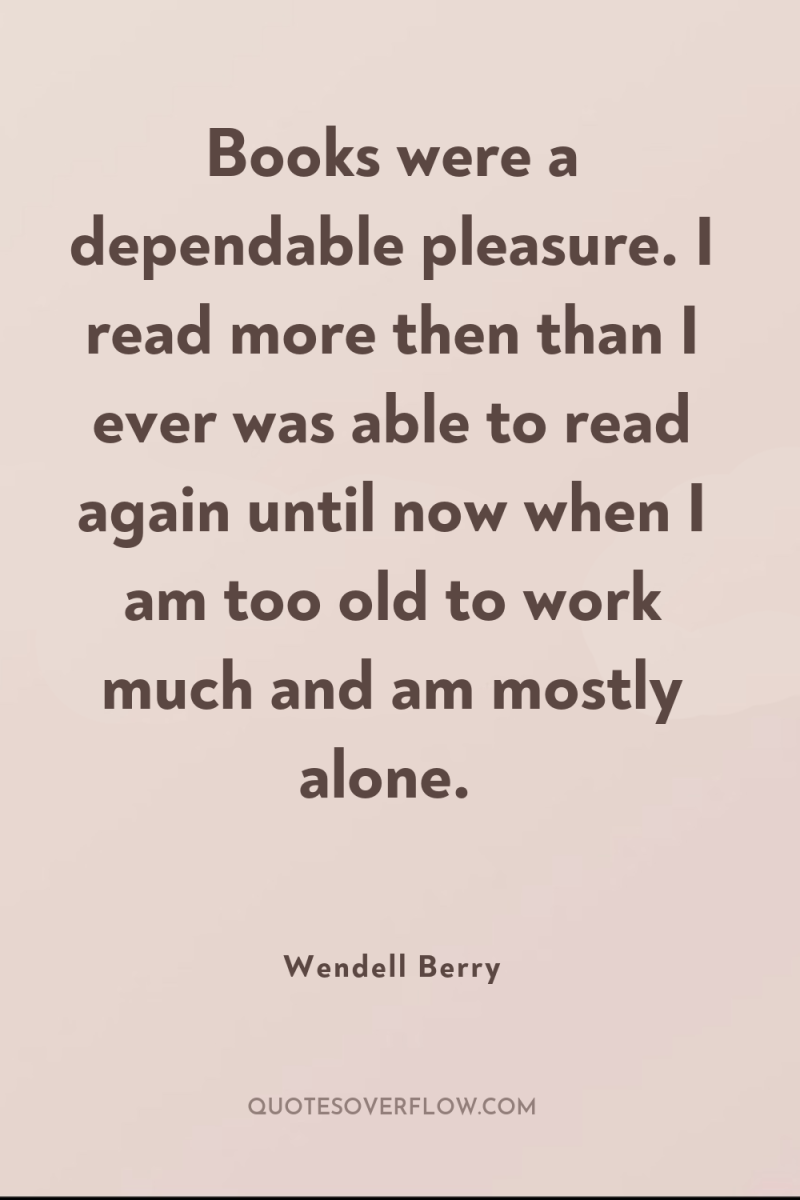
39
Books were a dependable pleasure. I read more then than I ever was able to read again until now when I am too old to work much and am mostly alone.Wendell Berry
40
As Gill says, "every man is called to give love to the work of his hands. Every man is called to be an artist." The small family farm is one of the last places - they are getting rarer every day - where men and women (and girls and boys, too) can answer that call to be an artist, to learn to give love to the work of their hands. It is one of the last places where the maker - and some farmers still do talk about "making the crops" - is responsible, from start to finish, for the thing made. This certainly is a spiritual value, but it is not for that reason an impractical or uneconomic one. In fact, from the exercise of this responsibility, this giving of love to the work of the hands, the farmer, the farm, the consumer, and the nation all stand to gain in the most practical ways: They gain the means of life, the goodness of food, and the longevity and dependability of the sources of food, both natural and cultural. The proper answer to the spiritual calling becomes, in turn, the proper fulfillment of physical need.Wendell Berry
41
This new war, like the previous one, would be a test of the power of machines against people and places; whatever its causes and justifications, it would make the world worse. This was true of that new war, and it has been true of every new war since.. I knew too that this new war was not even new but was only the old one come again. And what caused it? It was caused, I thought, by people failing to love one another, failing to love their enemies. .Wendell Berry
42
The most alarming sign of the state of our society now is that our leaders have the courage to sacrifice the lives of young people in war but have not the courage to tell us that we must be less greedy and less wasteful.Wendell Berry
43
In a society in which nearly everybody is dominated by somebody else's mind or by a disembodied mind, it becomes increasingly difficult to learn the truth about the activities of governments and corporations, about the quality or value of products, or about the health of one's own place and economy. In such a society, also, our private economies will depend less and less upon the private ownership of real, usable property, and more and more upon property that is institutional and abstract, beyond individual control, such as money, insurance policies, certificates of deposit, stocks, and shares. And as our private economies become more abstract, the mutual, free helps and pleasures of family and community life will be supplanted by a kind of displaced or placeless citizenship and by commerce with impersonal and self-interested suppliers.. Thus, although we are not slaves in name, and cannot be carried to market and sold as somebody else's legal chattels, we are free only within narrow limits. For all our talk about liberation and personal autonomy, there are few choices that we are free to make. What would be the point, for example, if a majority of our people decided to be self-employed? The great enemy of freedom is the alignment of political power with wealth. This alignment destroys the commonwealth - that is, the natural wealth of localities and the local economies of household, neighborhood, and community - and so destroys democracy, of which the commonwealth is the foundation and practical means. .Wendell Berry
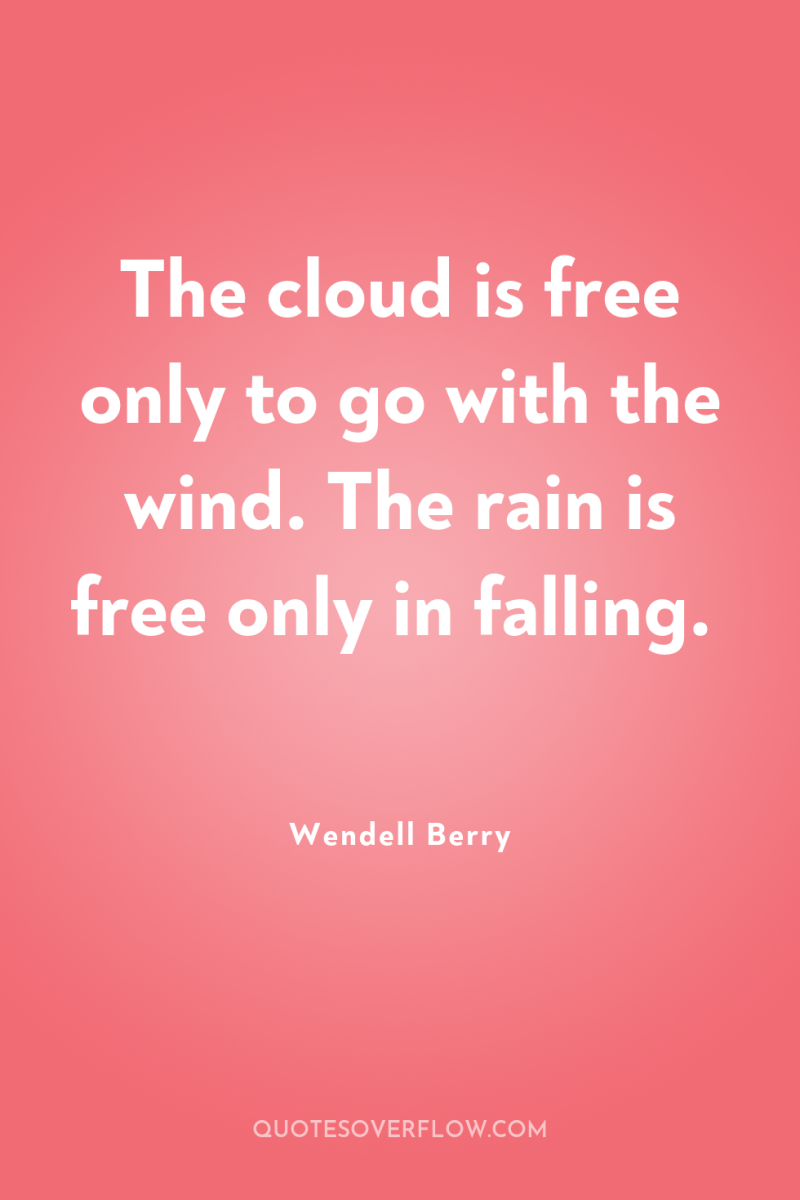
44
The cloud is free only to go with the wind. The rain is free only in falling.Wendell Berry
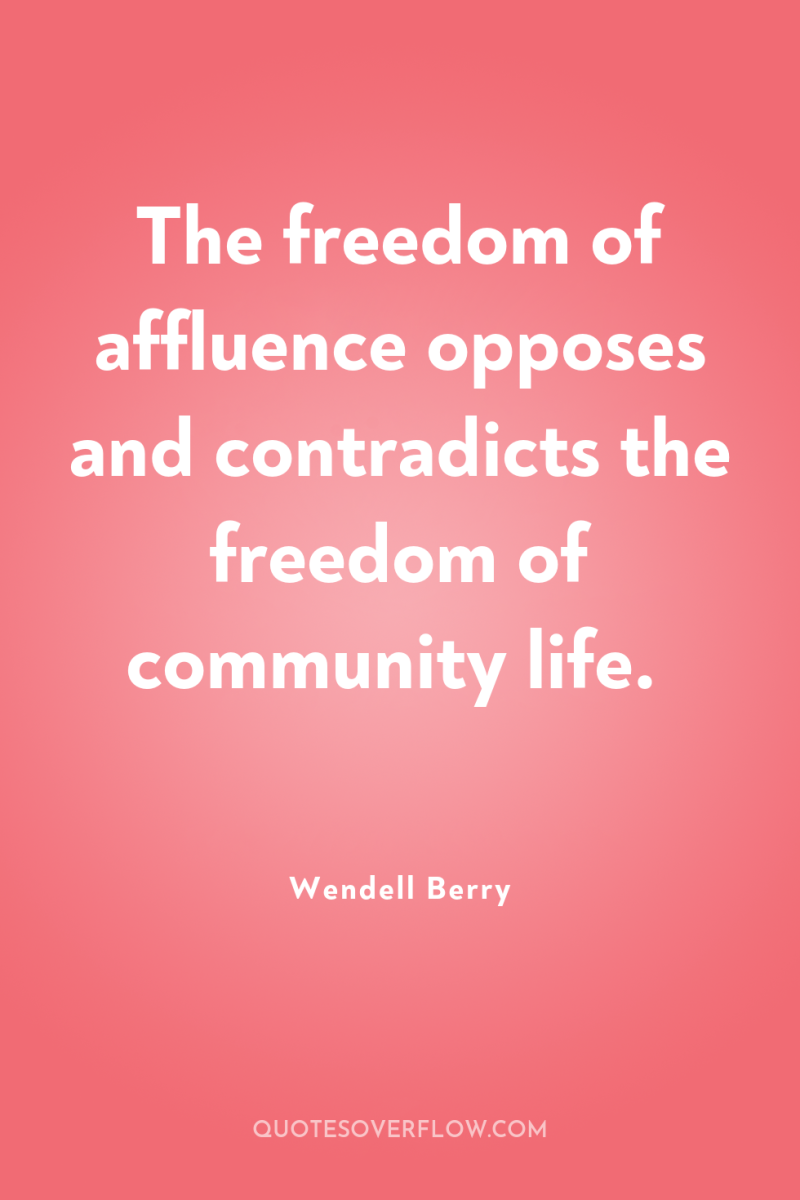
45
The freedom of affluence opposes and contradicts the freedom of community life.Wendell Berry
46
We still (sometimes) remember that we cannot be free if our minds and voices are controlled by someone else. But we have neglected to understand that we cannot be free if our food and its sources are controlled by someone else. The condition of the passive consumer of food is not a democratic condition. One reason to eat responsibly is to live free. (pg. 323, The Pleasures of Eating)Wendell Berry
47
If we apply our minds directly and competently to the needs of the earth, then we will have begun to make fundamental and necessary changes in our minds. We will begin to understand and to mistrust and to change our wasteful economy, which markets not just the produce of the earth, but also the earth's ability to produce. We will see that beauty and utility are alike dependent upon the health of the world. But we will also see through the fads and the fashions of protest. We will see that war and oppression and pollution are not separate issues, but are aspects of the same issue. Amid the outcries for the liberation of this group or that, we will know that no person is free except in the freedom of other persons, and that man's only real freedom is to know and faithfully occupy his place - a much humbler place than we have been taught to think - in the order of creation.(pg.89, "Think Little") .Wendell Berry
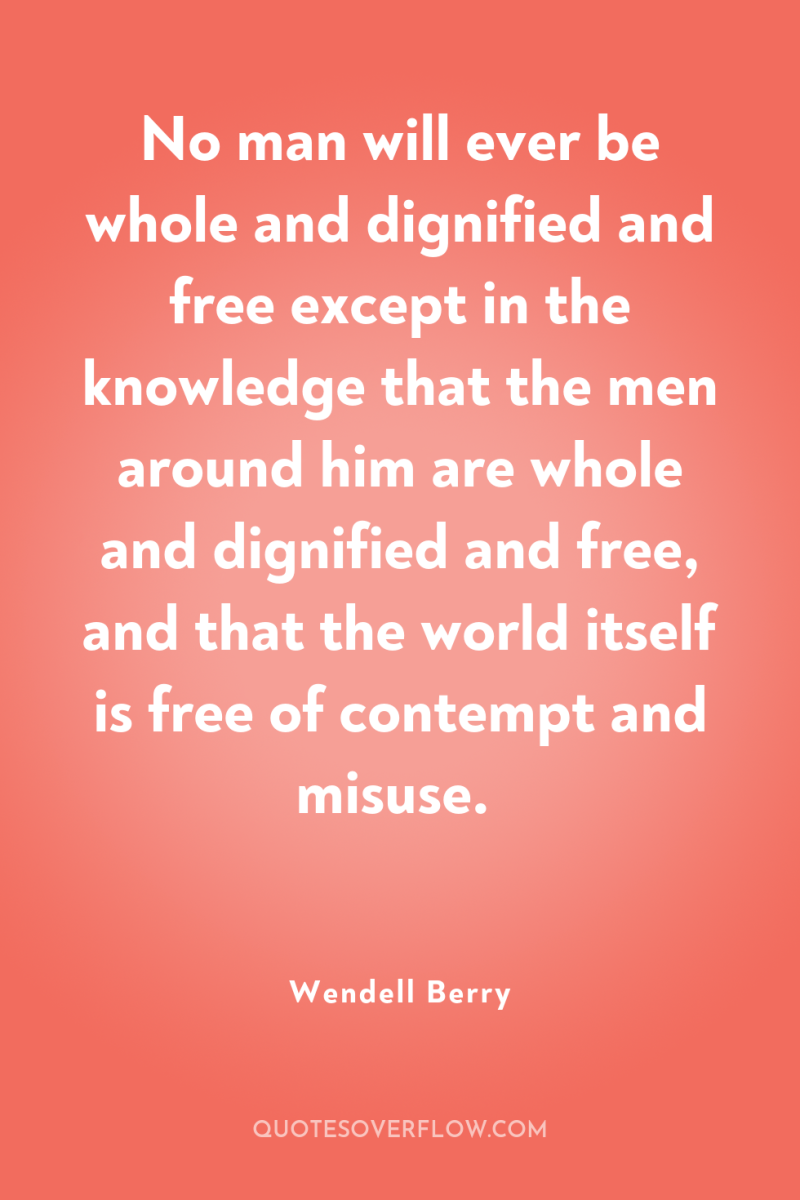
48
No man will ever be whole and dignified and free except in the knowledge that the men around him are whole and dignified and free, and that the world itself is free of contempt and misuse.Wendell Berry
49
It might seem to you that living in the woods on a riverbank would remove you from the modern world. But not if the river is navigable, as ours is. On pretty weekends in the summer, this riverbank is the very verge of the modern world. It is a seat in the front row, you might say. On those weekends, the river is disquieted from morning to night by people resting from their work. This resting involves traveling at great speed, first on the road and then on the river. The people are in an emergency to relax. They long for the peace and quiet of the great outdoors. Their eyes are hungry for the scenes of nature. They go very fast in their boats. They stir the river like a spoon in a cup of coffee. They play their radios loud enough to hear above the noise of their motors. They look neither left nor right. They don't slow down for - or maybe even see - an old man in a rowboat raising his lines.. I watch and I wonder and I think. I think of the old slavery, and of the way The Economy has now improved upon it. The new slavery has improved upon the old by giving the new slaves the illusion that they are free. The Economy does not take people's freedom by force, which would be against its principles, for it is very humane. It buys their freedom, pays for it, and then persuades its money back again with shoddy goods and the promise of freedom. .Wendell Berry
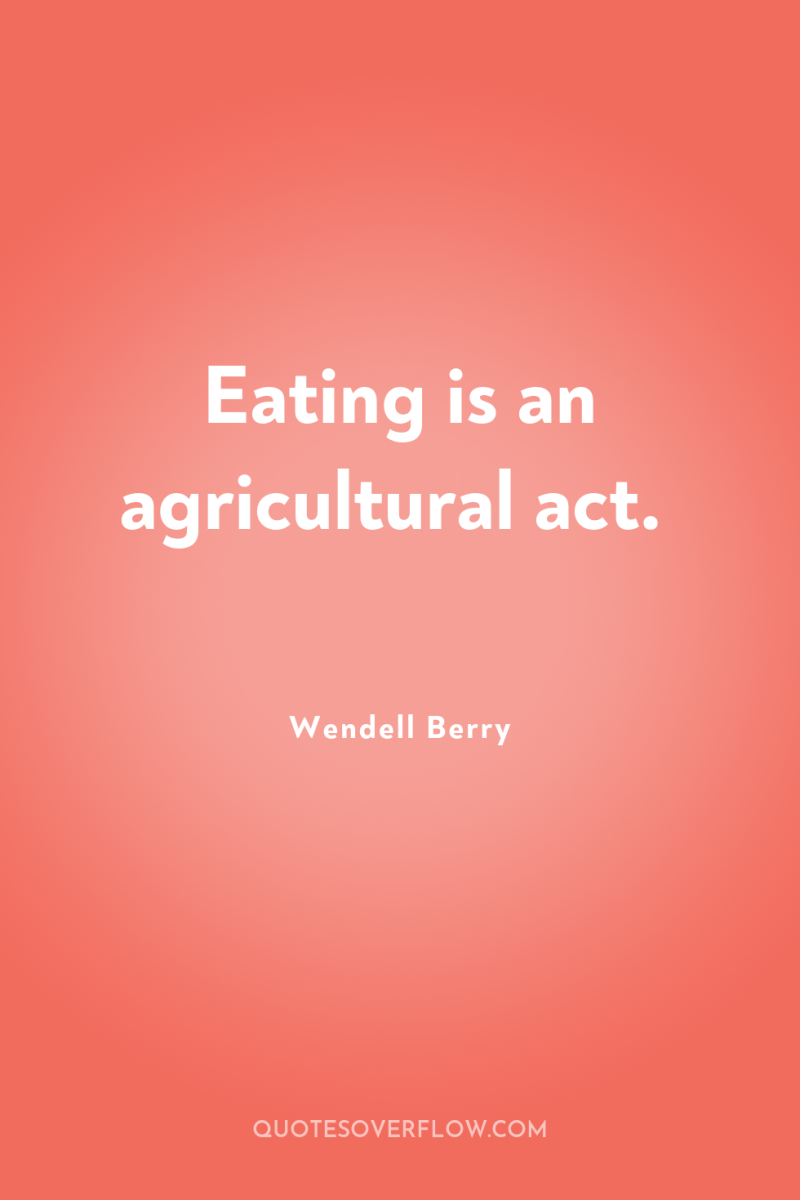
50
Eating is an agricultural act.Wendell Berry
51
We Americans are not usually thought to be a submissive people, but of course we are. Why else would we allow our country to be destroyed? Why else would we be rewarding its destroyers? Why else would we all – by proxies we have given to greedy corporations and corrupt politicians – be participating in its destruction? Most of us are still too sane to piss in our own cistern, but we allow others to do so and we reward them for it. We reward them so well, in fact, that those who piss in our cistern are wealthier than the rest of us. How do we submit? By not being radical enough. Or by not being thorough enough, which is the same thing.Wendell Berry
52
A proper community, we should remember also, is a commonwealth: a place, a resource, an economy. It answers the needs, practical as well as social and spiritual, of its members - among them the need to need one another. The answer to the present alignment of political power with wealth is the restoration of the identity of community and economy.(pg. 63, "Racism and the Economy")Wendell Berry
53
A crowd whose discontent has risen no higher than the level of slogans is only a crowd. But a crowd that understands the reasons for its discontent and knows the remedies is a vital community, and it will have to be reckoned with. I would rather go before the government with two people who have a competent understanding of an issue, and who therefore deserve a hearing, than with two thousand who are vaguely dissatisfied. But even the most articulate public protest is not enough. We don't live in the government or in institutions or in our public utterances and acts, and the environmental crisis has its roots in our lives. By the same token, environmental health will also be rooted in our lives. That is, I take it, simply a fact, and in the light of it we can see how superficial and foolish we would be to think that we could correct what is wrong merely by tinkering with the institutional machinery. The changes that are required are fundamental changes in the way we are living.Wendell Berry
54
We walked always in beauty, it seemed to me. We walked and looked about, or stood and looked. Sometimes, less often, we would sit down. We did not often speak. The place spoke for us and was a kind of speech. We spoke to each other in the things we saw.Wendell Berry
55
Where is our comfort but in the free, uninvolved, finally mysterious beauty and grace of this world that we did not make, that has no price? Where is our sanity but there? Where is our pleasure but in working and resting kindly in the presence of this world? (pg. 215, Economy and Pleasure)Wendell Berry
56
More and more, we take for granted that work must be destitute of pleasure. More and more, we assume that if we want to be pleased we must wait until evening, or the weekend, or vacation, or retirement. More and more, our farms and forests resemble our factories and offices, which in turn more and more resemble prisons–why else should we be so eager to escape them? We recognize defeated landscapes by the absence of pleasure from them. We are defeated at work because our work gives us no pleasure. We are defeated at home because we have no pleasant work there. We turn to the pleasure industries for relief from our defeat, and are again defeated, for the pleasure industries can thrive and grow only upon our dissatisfaction with them. Where is our comfort but in the free, uninvolved finally mysterious beauty and grace of this world that we did not make, that has no price? Where is our sanity but there? Where is our pleasure but in working and resting kindly in the presence of this world?.Wendell Berry
57
Lovers must not, like usurers, live for themselves alone. They must finally turn from their gaze at one another back toward the community. If they had only themselves to consider, lovers would not need to marry, but they must think of others and of other things. They say their vows to the community as much as to one another, and the community gathers around them to hear and to wish them well, on their behalf and its own. It gathers around them because it understands how necessary, how joyful, and how fearful this joining is. These lovers, pledging themselves to one another "until death, " are giving themselves away, and they are joined by this as no law or contract could join them. Lovers, then, "die" into their union with one another as a soul "dies" into its union with God. And so here, at the very heart of community life, we find not something to sell as in the public market but this momentous giving. If the community cannot protect this giving, it can protect nothing..Wendell Berry
58
It is possible, I think, to say that... a Christian agriculture [is] formed upon the understanding that it is sinful for people to misuse or destroy what they did not make. The Creation is a unique, irreplaceable gift, therefore to be used with humility, respect, and skill.Wendell Berry
59
The idea that people can be improved by being offended will finally have to meet the idea (espoused some of the time by some of the same people) that books, popular songs, movies, television shows, sex videos, and so on are "just fiction" or "just art" and therefore exist "for their own sake" and have no influence. To argue that works of art are "only" fictions or self-expressions and therefore cannot cause bad behavior is to argue also that they cannot cause good behavior. It is, moreover, to make an absolute division between art and life, experience and life, mind and body - a division that is intolerable to anyone who is at all serious about being a human or a member of a community or even a citizen.Wendell Berry
60
No one has madethe art by which one makes the worksof art. Each one who speaks speaksas a convocation. We live as councilsof ghosts. It is not "human genius"that makes us human, but an old love, an old intelligence of the heartwe gather to us from the world, from the creatures, from the angelsof inspiration, from the dead--an intelligence merely nonexistentto those who do not have it, but --to those who have it more dear than life. .Wendell Berry
61
To think better, to think like the best humans, we are probably going to have to learn again to judge a person's intelligence, not by the ability to recite facts, but by the good order or harmoniousness of his or her surroundings. We must suspect that any statistical justification of ugliness and violence is a revelation of stupidity. (pg.192-193, People, Land, and Community)Wendell Berry
62
Thinking is the most overrated human activity.Wendell Berry
63
My wish simply is to live my life as fully as I can. In both our work and our leisure, I think, we should be so employed. And in our time this means that we must save ourselves from the products that we are asked to buy in order, ultimately, to replace ourselves.Wendell Berry
64
Why do farmers farm, given their economic adversities on top of the many frustrations and difficulties normal to farming? And always the answer is: "Love. They must do it for love." Farmers farm for the love of farming. They love to watch and nurture the growth of plants. They love to live in the presence of animals. They love to work outdoors. They love the weather, maybe even when it is making them miserable. They love to live where they work and to work where they live. If the scale of their farming is small enough, they like to work in the company of their children and with the help of their children. They love the measure of independence that farm life can still provide. I have an idea that a lot of farmers have gone to a lot of trouble merely to be self-employed to live at least a part of their lives without a boss. .Wendell Berry
65
[All the ancient wisdom] tells us that work is necessary to us, as much a part of our condition as mortality; that good work is our salvation and our joy; that shoddy or dishonest or self-serving work is our curse and our doom. We have tried to escape the sweat and sorrow promised in Genesis - only to find that, in order to do so, we must forswear love and excellence, health and joy.(pg. 44, "The Unsettling of America") .Wendell Berry
66
The shoddy work of despair, the pointless work of pride, equally betray Creation. They are wastes of life.Wendell Berry
67
We have made it our overriding ambition to escape work, and as a consequence have debased work until it is only fit to escape from. We have debased the products of work and have been, in turn, debased by them.(pg. 43, "The Unsettling of America")Wendell Berry
68
Connection is health. And what our society does its best to disguise from us is how ordinary, how commonly attainable, health is. We lose our health - and create profitable diseases and dependences - by failing to see the direct connections between living and eating, eating and working, working and loving. In gardening, for instance, one works with the body to feed the body. The work, if it is knowledgeable, makes for excellent food. And it makes one hungry. The work thus makes eating both nourishing and joyful, not consumptive, and keeps the eater from getting fat and weak. This is health, wholeness, a source of delight. (pg.132, The Body and the Earth) .Wendell Berry
69
The two ideas, justice and vocation, are inseparable.... It is by way of the principle and practice of vocation that sanctity and reverence enter into the human economy. It was thus possible for traditional cultures to conceive that "to work is to pray." (pg. 258, The Idea of a Local Economy)Wendell Berry
70
As the connections have been broken by the fragmentation and isolation of work, they can be restored by restoring the wholeness of work. There is work that is isolating, harsh, destructive, specialized or trivialized into meaninglessness. And there is work that is restorative, convivial, dignified and dignifying, and pleasing. Good work is not just the maintenance of connections - as one is now said to work "for a living" or "to support a family" - but the enactment of connections. It is living, and a way of living; it is not support for a family in the sense of an exterior brace or prop, but is one of the forms and acts of love. (pg. 133, The Body and the Earth).Wendell Berry
71
We are working well when we use ourselves as the fellow creatures of the plants, animals, materials, and other people we are working with. Such work is unifying, healing. It brings us home from pride and from despair, and places us responsible within the human estate. It defines us as we are: not too good to work with our bodies, but too good to work poorly or joylessly or selfishly or alone. (pg. 134, The Body and the Earth) .Wendell Berry
72
We can say without exaggeration that the present national ambition of the United States is unemployment. People live for quitting time, for weekends, for vacations, and for retirement; moreover, this ambition seems to be classless, as true in the executive suites as on the assembly lines. One works not because the work is necessary, valuable, useful to a desirable end, or because one loves to do it, but only to be able to quit - a condition that a saner time would regard as infernal, a condemnation.Wendell Berry
73
The significance - and ultimately the quality - of the work we do is determined by our understanding of the story in which we are taking part.Wendell Berry
74
Another decent possibility my critics implicitly deny is that of work as a gift… They assume–and this is the orthodox assumption of the industrial economy–that the only help worth giving is not given at all, but sold. Love, friendship, neighbourliness, compassion, duty–what are they?Wendell Berry
75
We have lived our lives by the assumption that what was good for us would be good for the world. We have been wrong. We must change our lives so that it will be possible to live by the contrary assumption, that what is good for the world will be good for us. And that requires that we make the effort to know the world and learn what is good for it.Wendell Berry
76
...the care of the earth is our most ancient and most worthy and, after all, our most pleasing responsibility. To cherish what remains of it, and to foster its renewal, is our only legitimate hope.Wendell Berry
77
But even in the much-publicized rebellion of the young against the materialism of the affluent society, the consumer mentality is too often still intact: the standards of behavior are still those of kind and quantity, the security sought is still the security of numbers, and the chief motive is still the consumer's anxiety that he is missing out on what is "in." In this state of total consumerism - which is to say a state of helpless dependence on things and services and ideas and motives that we have forgotten how to provide ourselves - all meaningful contact between ourselves and the earth is broken. We do not understand the earth in terms either of what it offers us or of what it requires of us, and I think it is the rule that people inevitably destroy what they do not understand.Wendell Berry
78
We have lived by the assumption that what was good for us would be good for the world. And this has been based on the even flimsier assumption that we could know with any certainty what was good even for us. We have fulfilled the danger of this by making our personal pride and greed the standard of our behavior toward the world - to the incalculable disadvantage of the world and every living thing in it. And now, perhaps very close to too late, our great error has become clear. It is not only our own creativity - our own capacity for life - that is stifled by our arrogant assumption; the creation itself is stifled. We have been wrong. We must change our lives, so that it will be possible to live by the contrary assumption that what is good for the world will be good for us. And that requires that we make the effort to know the world and to learn what is good for it. We must learn to cooperate in its processes, and to yield to its limits. But even more important, we must learn to acknowledge that the creation is full of mystery; we will never entirely understand it. We must abandon arrogance and stand in awe. We must recover the sense of the majesty of creation, and the ability to be worshipful in its presence. For I do not doubt that it is only on the condition of humility and reverence before the world that our species will be able to remain in it. (pg. 20, "A Native Hill") .Wendell Berry
79
While the government is "studying" and funding and organizing its Big Thought, nothing is being done. But the citizen who is willing to Think Little, and, accepting the discipline of that, to go ahead on his own, is already solving the problem. A man who is trying to live as a neighbor to his neighbors will have a lively and practical understanding of the work of peace and brotherhood, and let there be no mistake about it - he is doing that work.. A man who is willing to undertake the discipline and the difficulty of mending his own ways is worth more to the conservation movement than a hundred who are insisting merely that the government and the industries mend their ways.(pg.87, "Think Little").Wendell Berry
80
We do not need to plan or devise a "world of the future"; if we take care of the world of the present, the future will have received full justice from us. A good future is implicit in the soils, forests, grasslands, marshes, deserts, mountains, rivers, lakes, and oceans that we have now, and in the good things of human culture that we have now; the only valid "futurology" available to us is to take care of those things. We have no need to contrive and dabble at "the future of the human race"; we have the same pressing need that we have always had - to love, care for, and teach our children.(pg. 73, "Feminism, the Body, and the Machine").Wendell Berry
81
I believe until fairly recently our destructions of nature were more or less unwitting -- the by-products, so to speak, of our ignorance or weakness or depravity. It is our present principled and elaborately rationalized rape and plunder of the natural world that is a new thing under the sun.Wendell Berry
82
The paramount doctrine of the economic and technological euphoria of recent decades has been that everything depends on innovation. It was understood as desirable, and even necessary, that we should go on and on from one technological innovation to the next, which would cause the economy to "grow" and make everything better and better. This of course implied at every point a hatred of the past, of all things inherited and free. All things superceded in our progress of innovations, whatever their value might have been, were discounted as of no value at all. .Wendell Berry
83
If we are to have a culture as resilient and competent in the face of necessity as it needs to be, then it must somehow involve within itself a ceremonious generosity toward the wilderness of natural force and instinct. The farm must yield a place to the forest, not as a wood lot, or even as a necessary agricultural principle but as a sacred grove - a place where the Creation is let alone, to serve as instruction, example, refuge; a place for people to go, free of work and presumption, to let themselves alone. (pg. 125, The Body and the Earth).Wendell Berry
84
Until we understand what the land is, we are at odds with everything we touch. And to come to that understanding it is necessary, even now, to leave the regions of our conquest - the cleared fields, the towns and cities, the highways - and re-enter the woods. For only there can a man encounter the silence and the darkness of his own absence. Only in this silence and darkness can he recover the sense of the world's longevity, of its ability to thrive without him, of his inferiority to it and his dependence on it. Perhaps then, having heard that silence and seen that darkness, he will grow humble before the place and begin to take it in - to learn from it what it is. As its sounds come into his hearing, and its lights and colors come into his vision, and its odors come into his nostrils, then he may come into its presence as he never has before, and he will arrive in his place and will want to remain. His life will grow out of the ground like the other lives of the place, and take its place among them. He will be with them - neither ignorant of them, nor indifferent to them, nor against them - and so at last he will grow to be native-born. That is, he must reenter the silence and the darkness, and be born again.(pg. 27, "A Native Hill").Wendell Berry
85
Once the creator was removed from the creation, divinity became only a remote abstraction, a social weapon in the hands of the religious institutions. This split in public values produced or was accompanied by, as it was bound to be, an equally artificial and ugly division in people's lives, so that a man, while pursuing Heaven with the sublime appetite he thought of as his soul, could turn his heart against his neighbors and his hands against the world.. Though Heaven is certainly more important than the earth if all they say about it is true, it is still morally incidental to it and dependent on it, and I can only imagine it and desire it in terms of what I know of the earth. (pg. 23, "A Native Hill") .Wendell Berry
86
I come into the peace of wild thingswho do not tax their lives with forethoughtof grief. I come into the presence of still water. And I feel above me the day-blind starswaiting with their light. For a time I rest in the grace of the world, and am free.Wendell Berry
87
It is to be broken. It is to betorn open. It is not to bereached and come to rest inever. I turn against you, I break from you, I turn to you. We hurt, and are hurt, and have each other for healing. It is healing. It is never whole.Wendell Berry
88
Marriage, in what is evidently its most popular version, is now on the one hand an intimate 'relationship' involving (ideally) two successful careerists in the same bed, and on the other hand a sort of private political system in which rights and interests must be constantly asserted and defended. Marriage, in other words, has now taken the form of divorce: a prolonged and impassioned negotiation as to how things shall be divided. During their understandably temporary association, the 'married' couple will typically consume a large quantity of merchandise and a large portion of each other. The modern household is the place where the consumptive couple do their consuming. Nothing productive is done there. Such work as is done there is done at the expense of the resident couple or family, and to the profit of suppliers of energy and household technology. For entertainment, the inmates consume television or purchase other consumable diversion elsewhere. There are, however, still some married couples who understand themselves as belonging to their marriage, to each other, and to their children. What they have they have in common, and so, to them, helping each other does not seem merely to damage their ability to compete against each other. To them, 'mine' is not so powerful or necessary a pronoun as 'ours.'This sort of marriage usually has at its heart a household that is to some extent productive. The couple, that is, makes around itself a household economy that involves the work of both wife and husband, that gives them a measure of economic independence and self-employment, a measure of freedom, as well as a common ground and a common satisfaction. (From "Feminism, the Body, and the Machine") .Wendell Berry
89
The forsaking of all others is a keeping of faith, not just with the chosen one, but with the ones forsaken. The marriage vow unites not just a woman and a man with each other; it unites each of them with the community in a vow of sexual responsibility toward all others. The whole community is married, realizes its essential unity, in each of its marriages.. Marital fidelity, that is, involves the public or institutional as well as the private aspect of marriage. One is married to marriage as well as to one's spouse. But one is married also to something vital of one's own that does not exist before the marriage: one's given word. It now seems to me that the modern misunderstanding of marriage involves a gross misunderstanding and underestimation of the seriousness of giving one's word, and of the dangers of breaking it once it is given. Adultery and divorce now must be looked upon as instances of that disease of word-breaking, which our age justifies as "realistic" or "practical" or "necessary, " but which is tattering the invariably single fabric of speech and trust.(pg.117, "The Body and the Earth") .Wendell Berry
90
Marriage has now taken the form of divorce: a prolonged and impassioned negotiation as to how things shall be divided. (from "Feminism, the Body, and the Machine")Wendell Berry
91
Marriage, in what is evidently its most popular version, is now on the one hand an intimate “relationship” involving (ideally) two successful careerists in the same bed, and on the other hand a sort of private political system in which rights and interests must be constantly asserted and defended. Marriage, in other words, has now taken the form of divorce: a prolonged and impassioned negotiation as to how things shall be divided. During their understandably temporary association, the “married” couple will typically consume a large quantity of merchandise and a large portion of each other.Wendell Berry
92
Akin to the idea that time is money is the concept, less spoken but as commonly assumed, that we may be adequately represented by money. The giving of money has thus become our characteristic virtue. But to give is not to do. The money is given in lieu of action, thought, care, time.Wendell Berry
93
I have this love for Mattie. It was formed in me as he himself was formed. It has his shape, you might say. He fits it. He fits into it as he fits into his clothes. He will always fit into it. When he gets out of the car and I meet him and hug him, there he is, him himself, something of my very own forever, and my love for him goes all around him just as it did when he was a baby and a little boy and a young man grown. .Wendell Berry
94
There are only two reasons to farm: because you have to, and because you love to. The ones who choose to farm choose for love.Wendell Berry
95
People who own the world outright for profit will have to be stopped by influence, by power, by us.Wendell Berry
96
No matter how much one may love the world as a whole, one can live fully in it only by living responsibly in some small part of it. Where we live and who we live there with define the terms of our relationship to the world and to humanity. We thus come again to the paradox that one can become whole only by the responsible acceptance of one's partiality.Wendell Berry
97
Nobody can discover the world for somebody else. Only when we discover it for ourselves does it become common ground and a common bond and we cease to be alone.Wendell Berry
98
He imagines a necessary joy in things that must fly to eat.Wendell Berry
99
The sunlight now lay over the valley perfectly still. I went over to the graveyard beside the church and found them under the old cedars.. I am finding it a little hard to say that I felt them resting there, but I did. I felt their completeness as whatever they had been in the world. I knew I had come there out of kindness, theirs and mine. The grief that came to me then was nothing like the grief I had felt for myself alone.. This grief had something in it of generosity, some nearness to joy. In a strange way it added to me what I had lost. I saw that, for me, this country would always be populated with presences and absences, presences of absences, the living and the dead. The world as it is would always be a reminder of the world that was, and of the world that is to come. .Wendell Berry
100
She was another gift, surely, to us all. She was a happiness that made me cry.Wendell Berry